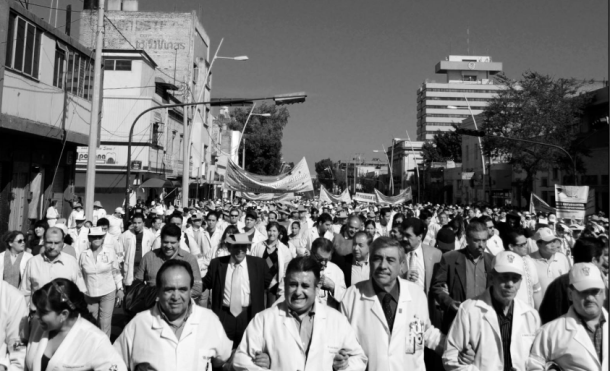While the Mexican government continues to face protests by teachers against Educational Reform, officials now must deal with another front: doctors and nurses in the public health systems. Right now a national strike is happening in more than 80 cities, with which the community health sector seeks to voice the trouble spots of the practice of their profession.
Universal Health System
In Mexico the health system is divided. Government workers are members of ISSSTE (funded between the government and workers), while workers of the private sector have the IMSS (paid by the government, and the share of both the worker and the employer). People’s Insurance exists for those who do not have any of the above, designed for Mexicans living in the informal economy. Each has a budget, hospitals, and clinics separately.

Doctors are protesting their working conditions in various Mexican cities. (PHOTO: hipertextual.com)
The Universal Health System, an initiative of President Enrique Peña Nieto — announced since 2013 — proposes that all public systems exchange resources for the 700 most common diseases among the Mexican population. That is, if a person has diabetes and for some reason the hospital or clinic that corresponds doesn’t have the human or material infrastructure to serve them, they could be treated in another hospital from another institution.
Doctors argue that this measure was enacted without consulting their union and without taking into account the differences and deficiencies of hospitals and clinics from the different affiliations, and that probably, many of them are not prepared to receive more patients.
Poor conditions in hospitals and lack of resources
In Mexico there are three levels of health care. In the highly specialized hospitals (level three) there usually is all that is needed, but entering them is difficult. Level two is composed of general hospitals, where Luis Guerrero — now a professor of medicine at UNAM — worked. He says they have started showing deficiencies: “We came to cancel surgeries because there weren’t enough sterilized clothes for patients”. Family care clinics, occupying the first level, often have shortages of medicines and materials due to mismanagement and corruption problems, requiring physicians to change treatment to fit to available drugs and not to the patient needs.
Insecurity and harrasment of medical staff
As part of their training, doctors at the end of their professional studies must do social service in some corner of the country. Given the violence plaguing Mexico during the last decade, doctors are not exempt and 70% of the trainees have experience violence during their internships.
Many future doctors must cover areas controlled by organized crime and try to overcome violence without falling victims to it. While the government requires them to fulfill that responsibility and commitment to their profession, it can not guarantee their safety. The places for internships are classified: A for cities, B for municipalities, C for rural areas, and CC for marginalized rural areas “unsuitable for women”.
In addition to crime, doctors must deal with violence and threats of patients and/or their relatives.
“The social service intern doctor is a slave,” says Guerrero. In addition to violence, interns must meet a minimum number of patients of different types monthly, as well as over 31 hours straight every third day, known among the community as “ABC guards”. “Imagine the attention of a doctor who has been like this for days”, says Guerrero.
Charges against medical staff
The national strike was called by the movement #YoSoyMedico17 (#IAmDoctor17), an organization born in 2014, when a judge gave an arrest warrant against 16 doctors charged with murder by medical malpractice on a teenager.
Their colleagues sympathized with the excessive response of the authorities, got organized and formed #YoSoyMedico17 against the criminalization of medical practice. “All medical procedures have complications”, says Guerrero. “Sometimes it is not possible to treat a patient as should because we don’t have all the material needed.”
When there are serious complications, some patients’ relatives often blame the doctors. “The law has so many holes that we can be found guilty”, says Guerrero.
Source: hipertextual.com




1 comment
Thanks for another wonderful article. 330330716